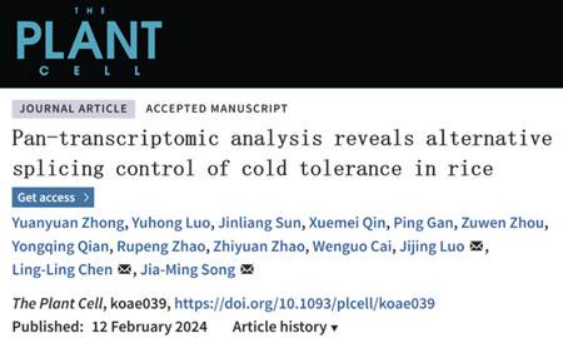Plant Cell | Lingling Chen/Jijing Luo team from Guangxi University and Jiaming Song from Southwest University used pantranscriptome to reveal a new regulatory mechanism of crop cold response
Release time: 2024-02-23

On February 12, 2024, team of Professor Chen Lingling and Luo Jijing from the College of Life Science and Technology of Guangxi University and professor Song Jiaming from Southwest University published a paper entitled “Pan-transcriptomic analysis reveals alternative splicing control of cold tolerance in rice” online in The Plant Cell. The paper generates the pan-transcriptome to characterize the transcriptional regulatory landscape of rice in response to cold stress, and the domestication selection of shear factors was involved in the ecological adaptation evolution of crops.
Based on transcriptome data of 11 indica and japonica rice materials under cold stress (Iso-Seq and RNA-Seq), the research team constructed rice pantranscriptome to characterize the cold response transcriptome regulatory landscape of different rice varieties. It was found that the transcriptome of indica rice and japonica rice showed significant differences in the late cold treatment period. Based on the pan-transcriptome data of rice under cold stress, the co-expression network of rice genes under cold stress was constructed, and OsCATC and Os03g0701200 genes were identified AS new candidate genes for engineering improvement to enhance cold tolerance of rice. Meanwhile, it was found that low temperature triggered large-scale AS event response in rice. AS is an important regulatory mechanism of rice response to cold stress.
Serine-arginine (SR) -rich proteins are an important class of splicing factors that promote variable splicing under a variety of abiotic stresses, thereby influencing plant response to these stresses. Through resequencing data analysis and phenotypic evaluation of 165 rice materials, it was found that splicing factors OsRS33 and OsRS2Z38 played an important role in cold tolerance of rice. The loss of OsRS2Z38 gene significantly decreased the cold tolerance of rice seedlings. In addition, OsRS2Z38 gene has different haplotypes between indica rice and japonica rice, and OsRS2Z38 alleles in japonica rice may play an important role in cold adaptation of japonica rice, that is, domestication selection of the spicing factor OsRS2Z38 is involved in the adaptive evolution of cultivated rice in Asia.
In summary, this study systematically analyzed the distribution, dynamic changes and regulatory mechanisms of AS in rice under cold stress, and explored the role of domestication selection of shear factors in crop adaptive evolution, providing innovative insights and rich resources for understanding the genetic basis of precise regulation and cold response mechanisms in plants under cold stress.
Guangxi University doctoral students Yuanyuan Zhong, Yuhong Luo and Jinliang Sun are co-first authors, while Lingling Chen and Jijing Luo from the School of Life Science and Technology of Guangxi University and Jiaming Song from Southwest University are co-corresponding authors. Prof. Li Rongbai provided germplasm resources support for this study. The research was supported by the National Natural Science Foundation of China, the Innovation Group of Guangxi Natural Science Foundation, the Young Talent Promotion Project of China Association for Science and Technology, and the independent Special project of the State Key Laboratory for the Protection and Utilization of Subtropical Agricultural and Forestry Biological Resources.
The paper link: https://doi.org/10.1093/plcell/koae039